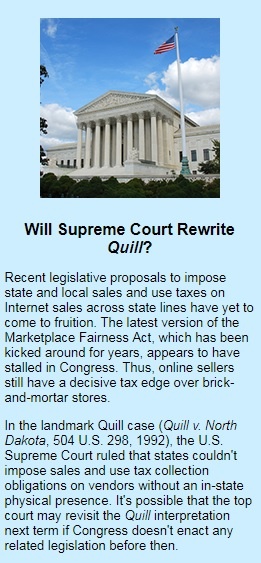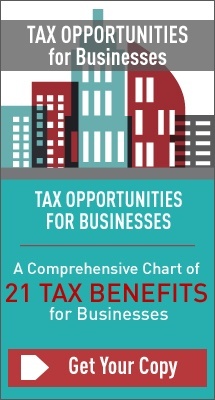 At the end of June, the U.S. Supreme Court adjourned for its summer recess. Here are five cases from its recent term that may be of interest to business owners and executives.
At the end of June, the U.S. Supreme Court adjourned for its summer recess. Here are five cases from its recent term that may be of interest to business owners and executives.
Advocate Health Care Network v. Stapleton (S. Ct. No. 16-74, June 5, 2017)
Under the Employee Retirement Income Security Act of 1974 (ERISA), employees are generally protected from unexpected losses in their retirement plans through various safeguards. However, church plans are specifically exempted from ERISA requirements, in order to avoid any entanglement of government and religion.
In this case, a group of employees work for a health care network that operates hospitals and in-patient and out-patient treatment centers in Illinois. The employees are covered under the network's retirement plan. The network was formed through a merger of two religiously affiliated hospital systems. Although neither system was owned or financially operated by a church, the network remains affiliated with a church.
The employees sued the network. They argued that the retirement plan is subject to ERISA and failing to meet the ERISA requirements is a violation of federal law. The network countered that its plan falls under the exception for church plans. The Seventh Circuit Court affirmed a lower court's ruling that a church-affiliated organization isn't a church plan within the meaning of the law.
In a June ruling, the U.S. Supreme Court unanimously agreed that the ERISA exemption for church plans applies to plans maintained by a church-affiliated organization, even if that organization didn't originally establish the plan.
READ MORE: Trump’s Tax Plan: The Potential Impact on Your Business
 TC Heartland LLC v. Kraft Food Brands Group LLC (S. Ct. No. 16-341, May 22, 2017)
TC Heartland LLC v. Kraft Food Brands Group LLC (S. Ct. No. 16-341, May 22, 2017)
A company organized under Indiana law and headquartered in Indiana sold liquid water-enhancing products that it shipped to Delaware in accordance with two of its contracts. But a major retailer, organized in Delaware with its primary place of business in Illinois, claimed that these products infringed on its patents for similar products.
The company selling the water-enhancing products argued that Delaware lacked jurisdiction over the lawsuit because the retailer isn't registered to do business in the state, has no business there and doesn't solicit any business there. A district court ruled that the subsection of the general venue statute allowing a defendant to reside in multiple jurisdictions for purposes of establishing jurisdiction applies to the patent venue statute.
This precedent conflicts with a previous Supreme Court case, Fourco Glass Co. v. Transmirra Products Corp. (353 U.S. 222, 1957). Fourco Glass holds that corporate jurisdiction is limited to the state of incorporation. The Fifth Circuit decided that the Congressional amendments to the general venue statute post-dated Fourco Glass and, therefore, superseded it.
However, in May, the Supreme Court unanimously ruled that the subsection of the general venue statute doesn't apply to the patent venue statute. Thus, the Fourco Glass case still prevails. In his opinion, Justice Thomas stated that the patent venue statute hasn't been amended, and it wasn't meant to dovetail with other venue statutes.
Star Athletica, LLC v. Varsity Brands, Inc. (S. Ct. No. 15-866, March 22, 2017)
In the Star Athletica case, the plaintiff is a company that designs and manufactures clothing and accessories used in various athletic activities, including cheerleading. The design concepts for the clothing incorporate several elements — such as colors, shapes and lines — but they don't consider the functionality of the final clothing. The plaintiff received copyright registration for two-dimensional artwork of designs that were similar to the ones that the defendant company began using.
In its lawsuit, the plaintiff alleged, among other claims, that the defendant had violated the Copyright Act of 1976. The defendant counter-claimed, asserting that the plaintiff had made fraudulent representations to the Copyright Office because the designs at issue couldn't be copyrighted.
Significantly, the defendant argued that the plaintiff didn't have valid copyrights because the designs were for "useful articles," which can't be copyrighted. Moreover, because the designs can't be separated from the uniforms, the designs are impossible to copyright. In response, the plaintiff claimed that the designs were separable and non-functional.
The Sixth Circuit ruled that the Copyright Act allows companies to copyright graphic features of a design, even if the design isn't separable from a "useful article." Then the matter was brought before the U.S. Supreme Court.
In a 6-2 vote, the Court decided that copyright protection is allowed if a feature incorporated into the design of a useful article:
- Can be perceived as a two- or three-dimensional work of art separate from the useful article, and
- Would qualify as a protectable pictorial, graphic or sculptural work — either on its own or fixed in some other tangible medium of expression — if it were imagined separately from the useful article into which it's incorporated.
Based on this interpretation, the plaintiff prevailed.
READ MORE: Business Owners: How to Avoid IRS Penalties for Using Independent Contractors
 Czyzewski v. Jevic Holding Corp. (S. Ct. 15-649, March 22, 2017)
Czyzewski v. Jevic Holding Corp. (S. Ct. 15-649, March 22, 2017)
In 2008, a trucking company that was headquartered in New Jersey filed for bankruptcy under Chapter 11 of the U. S. Bankruptcy Code. At that point, it owed about $53 million to its first-priority secured creditors and about $20 million to its tax and general unsecured creditors.
Two lawsuits were initiated in U.S. Bankruptcy Court against the trucking company:
- The truck drivers alleged that the trucking company violated federal and state Worker Adjustment and Retraining Notification (WARN) laws. Those rules require companies to provide workers with at least 60 days notice before layoffs.
- A fraudulent conveyance action was made on behalf of the unsecured creditors. In 2012, the parties to the fraudulent conveyance action negotiated a settlement that dismissed many of the claims. But the settlement left out the drivers. The drivers objected to the settlement because it distributed property to creditors of lower priority under the Bankruptcy Code.
The Third Circuit affirmed the district court's decision that the Bankruptcy Court had the discretion to approve a settlement scheme outside the Chapter 11 proceedings, even if it didn't comply with distribution priority scheme under the Bankruptcy Code.
In a 6-2 decision, the U.S. Supreme Court sided with the truck drivers. The Court held that bankruptcy courts may not approve structured dismissals that don't follow the priority order established in the Bankruptcy Code. While courts have flexibility, settlements must be viewed in light of the claims of affected creditors.
Kokesh v. Securities and Exchange Commission (S. Ct. No. 16-529, June 5, 2017)
The Securities and Exchange Commission (SEC) sued a New Mexico-based investment advisor for misappropriating funds from four business development companies. The district court found in favor of the SEC and ordered the advisor to pay $34.9 million for "the ill-gotten gains" connected to the violations. But the advisor argued this "disgorgement" remedy is barred by a five-year statute of limitations.
What is disgorgement? Funds received through illegal or unethical business transactions are disgorged, or paid back, with interest to those affected by the action. Companies that violate SEC regulations are typically required to pay both civil money penalties and disgorgement. In general, civil money penalties are considered punitive, while disgorgement is about paying back profits made from those actions that violated the SEC's regulations.
The Tenth Circuit held that the usual five-year statute of limitations didn't apply to this case because the ordered payment was remedial rather than punitive in nature. Therefore, a disgorgement payment may be allowed.
However, the Supreme Court has unanimously reversed the Tenth Circuit ruling. The Court decided that SEC disgorgement functions as a penalty, so it is subject to the five-year statute of limitations. This case is being widely viewed by commentators as a further erosion of the enforcement powers of the SEC.
© 2017





